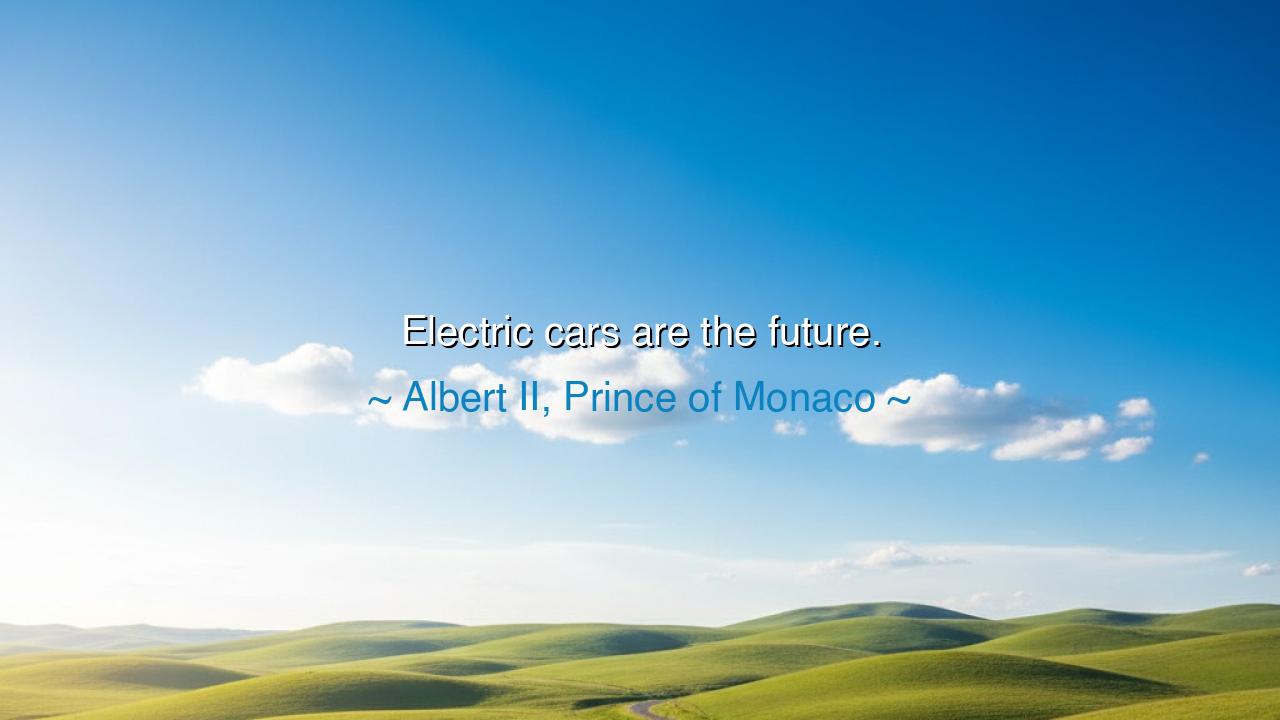
Electric cars are the future.






"Electric cars are the future." – Albert II, Prince of Monaco.
In this visionary statement, Prince Albert II of Monaco speaks to a future shaped by innovation, sustainability, and the responsible use of resources. His assertion that electric cars are the future reflects a profound understanding of the direction in which humanity must move in order to secure a livable planet for future generations. As we face the challenges of climate change, resource depletion, and pollution, the transition to clean energy solutions like electric cars represents not just a technological shift but a moral one. Prince Albert, as a leader committed to environmental stewardship, recognizes that the way forward lies in renewable energy and sustainable transportation.
The ancient wisdom of Heraclitus, who believed that everything is in a constant state of flux, is reflected in the urgency of Prince Albert’s vision. Heraclitus famously said, "The only constant in life is change," and his insight applies to the evolution of technology and society. The shift to electric cars is not merely a trend but a necessary transformation—one driven by the changing needs of the planet. Just as civilizations in the past adapted to new technologies—be it the wheel, the plow, or the printing press—we must now adapt to new forms of energy to ensure the continued prosperity of humanity.
Consider the ancient story of Archimedes, who, through his inventions and insights, laid the groundwork for future generations of scientists and engineers. Archimedes saw the world not as it was, but as it could be through the power of innovation. His understanding of leverage and buoyancy changed the way we think about engineering and problem-solving. Similarly, the development of electric cars, though born from the minds of modern engineers, is a reflection of the human spirit of progress. Electric vehicles are a new tool in our arsenal, one that promises to reduce the harmful impact of traditional fossil fuels while offering a cleaner, more sustainable way to move forward.
The great civilizations of antiquity, such as Rome and Greece, were often shaped by their innovations in technology—whether in architecture, transportation, or military strategy. Rome's roads, for example, connected an empire and facilitated trade, cultural exchange, and military conquest. But those roads were not built without the need for evolution. What we are witnessing today, in the transition to electric cars, is no less monumental. We are building the roads of the future, powered not by oil and coal, but by clean, renewable energy that promises to help us travel farther and live better.
Prince Albert’s call for electric cars also speaks to the ethical responsibility we have to future generations. The ancient wisdom of Confucius teaches that we must think not only of our own needs but also of those who will follow us. He said, "The superior man understands what is right; the inferior man understands what will sell." In this, he reminds us that true leadership is about making choices that benefit the collective and safeguard the well-being of all life. Electric vehicles, by reducing emissions and dependence on fossil fuels, represent a step toward a more ethical future—one where our choices today do not come at the expense of tomorrow’s generations.
In today’s world, where the consequences of climate change and environmental degradation are increasingly visible, Prince Albert’s words ring with a sense of urgency and clarity. The future of transportation, like the future of society itself, must be built on sustainability. As electric cars become more accessible and widespread, they promise to reduce air pollution, greenhouse gas emissions, and reliance on non-renewable resources. This shift not only benefits the environment but also encourages the growth of green technologies and sustainable industries, paving the way for a world where innovation and responsibility go hand in hand.
The lesson here is one of visionary leadership—the ability to look ahead and anticipate the changes necessary for a better, more sustainable world. Like Prince Albert, we must be willing to embrace the future with an open mind, recognizing that change is not something to fear but something to embrace. Let us look to the innovation of electric cars as a symbol of the transformation that is possible when we harness human ingenuity for the greater good. In our own lives, let us seek to make choices that reflect the values of sustainability, innovation, and care for the planet, knowing that each step we take today shapes the world of tomorrow. The future is electric—and it is our responsibility to ensure that we meet it with courage, vision, and hope.






AAdministratorAdministrator
Welcome, honored guests. Please leave a comment, we will respond soon